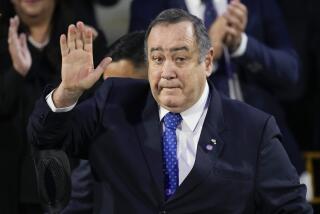Powell: Another Year or More for U.S. in Iraq
Secretary of State Colin L. Powell said today that “significant numbers” of U.S. troops would continue fighting in Iraq for at least another year.
Echoing President Bush’s sober statement of a day earlier, Powell, preparing to leave office after four years as the nation’s chief diplomat, warned that the Jan. 30 election in Iraq “is not going to end the insurgency” there.
“I think that certainly we’re going to be there through ’05 in significant numbers,” Powell told reporters. “I don’t know what those numbers will be.”
Powell’s comments, like Bush’s, appeared to reflect a drive by the administration to head off public pressure to withdraw significant numbers of U.S. troops after the Iraqi election.
As recently as October, Secretary of Defense Donald H. Rumsfeld said it might be possible to draw down U.S. forces in Iraq after the election. But in recent weeks, U.S. officials have taken pains to warn that the election is unlikely to be the kind of turning point that leads to the withdrawal of American troops.
“The elections in January are just the beginning of a process, and it’s important for the American people to understand that,” Bush said at his news conference.
Powell also turned aside any thought of bringing leaders of the insurgency into discussions with U.S. officials.
“We will not talk to the leaders of the insurgency. They are terrorists, they’re murderers, and they have no interest in a free fair election or democratic participation in that election or they wouldn’t be doing what they’re doing,” he said.
And, he said that the election would not end the insurgency.
“Those who are determined to defeat the forces of democracy are not going to stop just because there’s an election at whatever level of participation,” he said.
Powell’s statement that significant numbers of troops would stay in Iraq through 2005 was consistent with recent statements by military officials. But while Pentagon officials have coupled that forecast with a hope that some draw-down would be possible soon, the secretary of state, a former Army general and chairman of the Joint Chiefs of Staff, left that subject open.
Gen. George W. Casey Jr., the commander of U.S. forces in Iraq, said Dec. 16 that he believes the United States will achieve its major objectives in Iraq by the end of 2005.
“My view of winning is that we are broadly on track to accomplishing our objectives, which is a constitutionally elected government that is representative of all the Iraqi people and with Iraqi security forces that are capable of maintaining domestic order and denying Iraq as a safe haven for terror,” Casey said. “And I believe we will get there by the end of December ’05.”
Bush, on Monday, acknowledged that the United States and its allies had experienced “mixed” results in training Iraqi forces to step in for the U.S. troops in the breadth of security missions required in Iraq.
Powell, in language reflecting his career as an Army officer, said, “I can train a group of soldiers from nothing to good solid soldiers in--take our own experience, eight weeks of basic, eight weeks of advanced individual training--so after about four months you’ve got a pretty good soldier.”
But, he added, assembling a platoon and training it, putting the platoon in a company and providing more training, building battalions and eventually assembling a division and bringing it up to fighting form could take a year to a year and a half.
“If you’re just talking about police training or soldiers in militia-kind of units, then it’s a matter of months,” he said. “It’s also a lot harder when the day they come out of training they’re facing combat.”
“A lot of training is going to come on the battlefield,” Powell added.
“There should be no illusion and I think the president made this point yesterday that suddenly the day after the election that the Iraqis are going to be able to take over their own security,” the secretary of state said.
He said it was up to Rumsfeld to determine the specific numbers.
Powell said the attacks today in Mosul, which killed more than 20 people, demonstrated, as Bush said on Monday, “that we have a difficult insurgency that we are fighting, that these individuals are determined to take Iraq back to the past and not have elections that will produce a government that is representative of the people.”
He expressed determination to “use all the resources at our disposal to defeat this insurgency so we that we can have the election on the 30th of January....”
More to Read
Start your day right
Sign up for Essential California for news, features and recommendations from the L.A. Times and beyond in your inbox six days a week.
You may occasionally receive promotional content from the Los Angeles Times.







